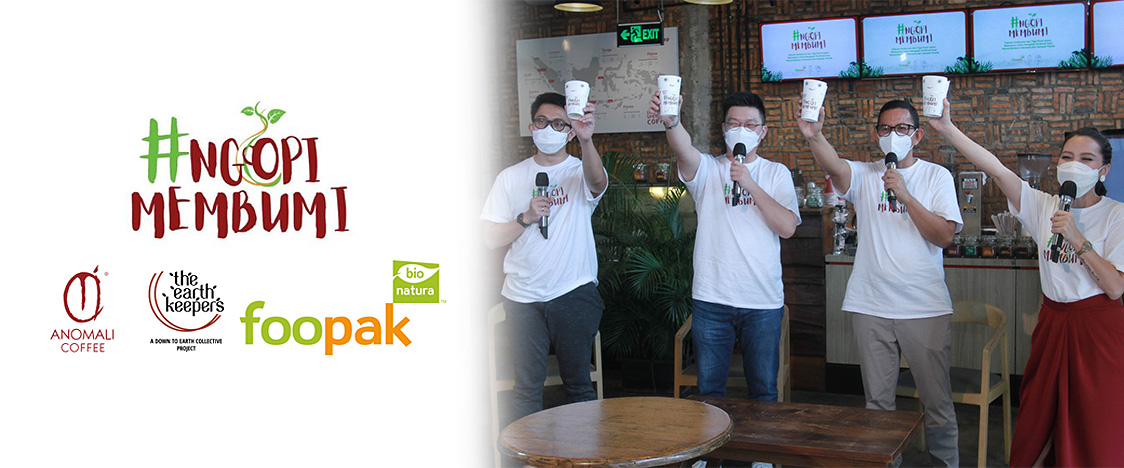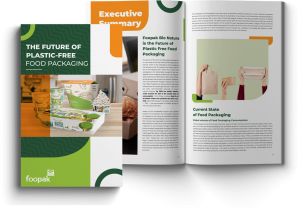
- Six out of ten coffee enthusiasts admit to using at least 1-2 paper or plastic cups every week while purchasing their preferred coffee.
- To make the world a greener place, a collaboration of an environmentally friendly packaging company, a coffee enterprise, and an environmental organization was formed.
- Coffee enthusiasts are being encouraged to embrace an eco-friendly lifestyle by purchasing food and beverages packaged in specifically designed packaging that can be composted within 24 weeks (home compostable).
Plastic packaging waste is primarily produced by humans and has the potential to jeopardize environmental sustainability. World Economic Forum 2020 estimated that plastic waste is expected to increase from 260 million tons per year to 460 million tons per year by 2030. Paper is an alternative material to limit the usage of plastic packaging. However, today’s commonly used paper food and beverage packaging generally has plastic coating on the inside that prevents water or liquid from soaking the paper. Since extracting paper from the plastic layer is such a complex procedure, it could pose yet another danger to environmental sustainability. With the rising popularity of coffee among young Indonesians, it is likely that the use of plastic-coated paper cups will rise as well.
As the Republic of Indonesia celebrates its 76th independence, three pioneer institutions in their respective fields, Foopak Bio Natura (a producer of paper-based F&B packaging), Anomali Coffee (an F&B company that is also the curator of Nusantara coffee), and Earth Keepers Indonesia (an environmentalist organization), initiated the #NgopiMembumi movement. Fusing the coffee and eco-friendly lifestyles together, this movement aims to help create a plastic-free Indonesia, through the use of recyclable, compostable, and biodegradable food and beverage packaging.
Teguh Handoko, founder of The Earth Keepers Indonesia, stated that “By 2050, the United Nations Environment Program (UNEP) predicts that plastic will outnumber fish in the oceans. Most plastics are not biodegradable. Plastic takes over 400 years to degrade, and even then, it is never completely degraded, rather fragmented into small pieces that eventually contaminate marine life and endanger humans. Plastic waste is inextricably linked to the lifestyles of those who use plastic to package food and beverages. The coffee shop is one of the industries that makes extensive use of plastic packaging. Indeed, not all foods and beverages are packaged or served in plastic containers or cups; some are packaged or served in paper containers or cups. However, most paper cups used in Indonesia today are coated with plastic.”
According to a survey conducted by The Earth Keepers Indonesia, six out of ten coffee connoisseurs in Jakarta admitted to visiting their favorite coffee shop at least once a week to enjoy coffee. The majority of these survey participants admitted to utilizing at least 1-2 plastic cups in a week when purchasing their preferred iced coffee. Many of them admitted to not separating organic and non-organic waste when disposing their coffee packaging due to a lack of knowledge about proper waste-disposal procedures.
Each year, the global production of paper cups increases by 3-5 percent, with the Asia Pacific region experiencing the fastest growth. Unfortunately, less than 1% of the annual global production of +320 billion paper cups is recycled due to the intricate paper-plastic separation process Product Manager – Foopak, Asia Pulp & Paper, Benny Chiadarma, explained, “Foopak obtained data from LIPI indicating that 96 percent of food delivery in Indonesia is packaged in plastic. To fulfill our commitment to providing more environmentally friendly packaging, Asia Pulp & Paper (APP) Sinar Mas introduced its latest innovation, Foopak Bio Natura, a special paper-based packaging for food and beverage that is plastic-free, recyclable, and compostable – industrially as well as at home. Foopak Bio Natura is also guaranteed to be food grade, heat resistant (microwaveable and ovenable), and made entirely of high-quality paper materials from Industrial Plantation Forest (HTI) areas whose supply chain is nationally and internationally certified.”
Foopak Bio Natura is recyclable due to its water-based coating. Additionally, Foopak Bio Natura has been proven to be easier to recycle into recycled paper and composts more quickly (approximately 12 – 24 weeks), both in industrial and home-based processes. Along with being more environmentally-friendly, Foopak Bio Natura’s packaging products have been tested to ensure they are free of harmful compounds and PFAS. Foopak also always ensures the halal status of its products through strict monitoring of raw materials, manufacturing equipment, storage methods, and distribution.
As a curator of Indonesian coffee that is popular among coffee connoisseurs, particularly the youth, and with more than ten locations in major cities throughout the country, Anomali Coffee leverages its market share to educate Indonesians about the importance of being an environmentally conscious individual. Rezha Ahmad, Business Development of Anomali Coffee stated, “Anomali has always been committed to environmental preservation; from the beginning, we’ve minimized our dependence on plastic by using paper packaging. The #NgopiMembumi collaboration is a significant step in Anomali Coffee’s effort and journey toward a more climate conscious food & beverage experience. We hope that this initiative shows that we can always enjoy the things we love like coffee with environmentally friendly choices. The community’s support for this effort will be greatly beneficial on many sides: our coffee, our lovely community, and our nation. A wonderful innovation such as Foopak’s will surely ease our process in adapting to a more plastic-free environment.
Through this collaboration, Foopak Bio Natura, Anomali Coffee, and The Earth Keepers Indonesia aim to encourage the use of F&B packaging that is easier to recycle and compost as a solution to Indonesia’s poor recycling rate of paper cups. The three partners hope that Indonesians, particularly coffee drinkers and culinary entrepreneurs, will take an active role in establishing a more responsible and environmentally friendly lifestyle to achieve a plastic-free Indonesia.
###
For more information, please contact:
#NgopiMembumi:
- Instagram: @foopak.id, @theearthkeepers.id @anomalicoffee
- Website: www.ngopimembumi.foopak.com
Or please contact:
Team #NgopiMembumi
Inur Malik Vega
0811947775

